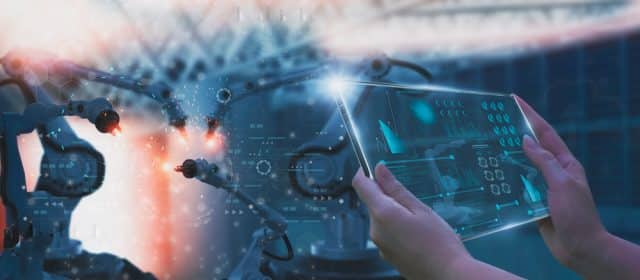6 industries that will be affected by AI in 2022

Artificial intelligence is shaping the future of how people work, live, and play, and its impact will grow in 2022. Just as robotics affected certain industries more than others, artificial intelligence (AI) will be at the forefront of change in a few particular industries going into 2022. Some of these industries may even come as a surprise.
A recurring theme when it comes to the growth of AI is its value for augmenting the skills of humans or filling in their gaps without actually replacing human workers. What many industries are finding is that they still need human employees, but AI can help them work safer, faster, and smarter. These six industries will be at the center of the AI ripple effect in the year ahead.
1. Transportation
AI-powered vehicles are closer to mainstream availability than ever, and 2022 could be the year that autonomous vehicles finally take off. The trucking industry, for example, is experiencing a serious driver shortage in the midst of a supply chain crisis that is not showing signs of slowing as 2021 draws to a close. Since highways can be surprisingly easy for an AI to navigate, driverless semi-trucks are already on the rise. In fact, one autonomous semi-truck is already being independently road-tested in Silicon Valley.
Similarly, the COVID-19 pandemic has led to a resurgence of interest in driverless ride-sharing or taxi services. These have been tested in the past, though progress has been slowed by accidents. More road data will help autonomous vehicle AI learn and adapt better, increasing the chances of a fully-functioning driverless car for the masses sometime in 2022.
2. Computer and Data Science
Computer and data scientists are using AI in their own workplaces in addition to creating new AI algorithms. AI is changing the face of cybersecurity. With the rise of widespread working from home in 2020, cybercrime has gone up significantly as private data has become more difficult to contain. It’s no wonder why the cybersecurity AI market is expected to grow by an impressive 23.6 percent between 2020 and 2027.
The computer and data science industries will also experience growth in demand for more AI programs during 2022. Computer science is essentially the supply chain for all of the new AI programs powering the future. Whether AI is being used to streamline the coding process, analyze data, protect data, or AI itself is the product, artificial intelligence will be at the core of computer and data science in 2022.
3. Skilled Trades
The skilled trade fields are in a unique position right now because they’re facing a steep staffing shortage. But implementing AI to fix it is proving difficult. Artificial intelligence is good at learning things, so many have speculated about implementing AI to automate certain skilled trade tasks. While the skilled trades will continue to see attempts like this in 2022, it is unlikely that AI will be able to perform comparably to the capabilities of quality skilled workers who have years of specialized training.
This is especially true in skilled trades that require some creativity and a sense of aesthetics. Painters, hairdressers, and landscapers, for example, are not likely to encounter AI competition any time soon. An overhaul of the skilled trades with widespread AI is much less likely to occur than a soft introduction of AI tools that help skilled trades workers perform their jobs better.
4. Entertainment
The entertainment industry is a key force driving innovation in artificial intelligence. Video game designers recently developed an AI that created a playable original videogame at the Georgia Institute of Technology. As the video game industry continues to surge in popularity in 2022, it is likely that AI systems will be used more in the creation of video games.
Meanwhile, in film and TV, AI algorithms are already in use on most of the world’s top video streaming platforms, such as Netflix, where an AI recommends content to viewers. Even more impressive is the use of AI to create actual film content, as was seen in the world’s first AI-generated movie trailer for the 2016 thriller "Morgan." Despite the challenges of the COVID-19 pandemic, the entertainment industry is still booming, so an increase in the use of AI in film and TV is highly likely.
5. Health Care
The health care industry is full of potential for AI applications, and 2022 will be a big year for development. Health care centers are seeking solutions to help them keep up with the challenges of the ongoing pandemic, including AI. Industry leaders have theorized that AI tools will soon help doctors make more accurate diagnoses using next-generation medical tools.
Additionally, AI is helping health care providers manage and secure massive amounts of patient and doctor data. 2022 will see the development of new AI and machine learning tools for diagnosing and treating patients, using the advanced analysis and computing capabilities of AI to help heal and care for millions of people.
6. Education
AI is on track to be the next big innovation in ed-tech, for teachers and students alike. 2021 made these advancements even more important, between a critical teacher shortage and the popularity of online learning. In 2022, AI could become much more prevalent in the education sector. For example, education experts have pitched developing AI chatbots that can help students learn from home with their homework.
Further into the future, students could even learn from AI teachers. Samsung’s STAR Labs team recently unveiled a program called NEON that generates digital AI people, complete with appearances and personalities. One of the jobs mentioned for the NEONs is teaching.
The Future of AI
Artificial intelligence is becoming an increasingly important part of our daily lives, but not in the spooky way predicted by some sci-fi thrillers. What many industries, these four in particular, are seeing is the rise of collaborative AI, created to expand the capabilities of talented human workers. AI isn’t a threat to tomorrow’s workforce -- it’s the key to empowering tomorrow’s workforce.
Photo credit: ART STOCK CREATIVE/ Shutterstock

Devin Partida writes about AI, apps and technology at ReHack.com, where she is Editor-in-Chief